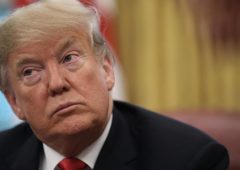USA Should Wait Longer Before Cutting Rates – IMF
18.07.2024 20:38 2 min. read Alexander Stefanov
On July 18, the European Central Bank (ECB) opted to keep its key interest rates unchanged, signaling a pause aimed at addressing persistent inflation concerns.
The decision, which maintains rates at 4.25% for main refinancing operations, 4.5% for the marginal lending facility, and 3.75% for the deposit facility, underscores the ECB’s commitment to a cautious monetary policy stance.
ECB officials anticipate inflation remaining above their 2% target well into the next year. They emphasized a data-driven approach, with policy rates set to remain restrictive to achieve inflation objectives. Additionally, the ECB outlined gradual reductions in its Asset Purchase Programme (APP) and Pandemic Emergency Purchase Programme (PEPP) portfolios.
Meanwhile, the International Monetary Fund (IMF) has advised the U.S. Federal Reserve to delay interest rate cuts until “late 2024.” This recommendation aligns with the Fed’s current stance, influenced by robust economic growth and ongoing inflation worries. The IMF’s cautionary stance aims to ensure that any rate cuts are supported by sustained evidence of inflation stabilizing.
READ MORE:

American Company Bets Against Trump Media Day Before the Assassination Attempt – Coincidence?
The potential implications of the Fed mirroring the ECB’s cautious approach include significant impacts on the cryptocurrency market, particularly Bitcoin (BTC). Historically, Bitcoin has reacted sensitively to interest rate changes, with higher rates often prompting reduced investment in riskier assets like cryptocurrencies. A prolonged period of elevated interest rates could thus temper investor enthusiasm for Bitcoin, potentially affecting its liquidity and pricing dynamics.
Furthermore, uncertainties surrounding future rate cuts and the IMF’s conservative guidance may introduce volatility into the market. Analysts from Deutsche Bank and TD Securities foresee continued scrutiny of the Fed’s communications for indications of a softer stance on rate adjustments. This cautious approach reflects ongoing economic uncertainties and their potential implications for global financial markets.
-
1
U.S. PCE Inflation Rises for First Time Since February, Fed Rate Cut Likely Delayed
27.06.2025 18:00 1 min. read -
2
Key U.S. Economic Events to Watch Next Week
06.07.2025 19:00 2 min. read -
3
Gold Beats U.S. Stock Market Over 25 Years, Even With Dividends Included
13.07.2025 15:00 1 min. read -
4
U.S. Announces Sweeping New Tariffs on 30+ Countries
12.07.2025 16:30 2 min. read -
5
US Inflation Heats Up in June, Fueling Uncertainty Around Fed Cuts
15.07.2025 16:15 2 min. read
US Inflation Heats Up in June, Fueling Uncertainty Around Fed Cuts
U.S. inflation accelerated in June, dealing a potential setback to expectations of imminent Federal Reserve rate cuts.
Gold Beats U.S. Stock Market Over 25 Years, Even With Dividends Included
In a surprising long-term performance shift, gold has officially outpaced the U.S. stock market over the past 25 years—dividends included.
U.S. Announces Sweeping New Tariffs on 30+ Countries
The United States has rolled out a broad set of new import tariffs this week, targeting over 30 countries and economic blocs in a sharp escalation of its trade protection measures, according to list from WatcherGuru.
Key U.S. Economic Events to Watch Next Week
After a week of record-setting gains in U.S. markets, investors are shifting focus to a quieter yet crucial stretch of macroeconomic developments.
-
1
U.S. PCE Inflation Rises for First Time Since February, Fed Rate Cut Likely Delayed
27.06.2025 18:00 1 min. read -
2
Key U.S. Economic Events to Watch Next Week
06.07.2025 19:00 2 min. read -
3
Gold Beats U.S. Stock Market Over 25 Years, Even With Dividends Included
13.07.2025 15:00 1 min. read -
4
U.S. Announces Sweeping New Tariffs on 30+ Countries
12.07.2025 16:30 2 min. read -
5
US Inflation Heats Up in June, Fueling Uncertainty Around Fed Cuts
15.07.2025 16:15 2 min. read

